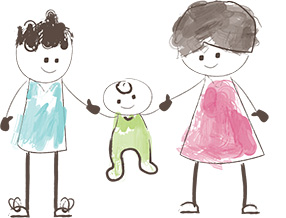
Our THRIVE Support Team

This project is funded by the wonderful
National Lottery Community Fund.
THRIVE Service Introduction
Our THRIVE project was started in 2015 born from the passionate views of our management, staff, along with the feedback and regular chats we have with our community of parent carers to address the needs of older parent carers.
Parents often describe the extremely difficult experiences and fears they have when trying to establish a positive way of life when their learning disabled child transitions to adulthood, and then later on in life when the parents themselves become less able to care due to old age or illness. From our discussions with the parents we support the common thought is as soon as a child turns 18 years old they ‘fall of the face of the earth’ when it comes to statutory help, and they are on their own from that point, which causes them much distress and fear.
Our project aims to provide a place to go and get help, advice and support from people who have lived experience of caring for young adults, and the extra challenges that come later on in life.
THRIVE Service – Carers with Young Adult Children (19-30 years old)
When children with mild to severe learning disabilities leave the education system they tend fall off the grid when it comes to statutory support. From our extensive experience, and the feedback we receive from our parent carers this is the biggest and hardest phase of caring process, with parents many worried sick about the future prospects for their child moving into a challenging adult world.
We therefore believe there is a strong need for specialised support to help parent and young person adapt to adulthood, and where capable establish their own independence to become a positive and valued member of society. Which is both good for their mental health and wellbeing, and for the community as a whole.
The transition from child to adulthood is very challenging and disruptive for families to adapt to. Whereas previously the child would be at school most of the day, with an established routine for both parent and child. When they leave school they have to find a new daily routine. Many of these children can fall through the cracks and struggle to find a role in society. Which can lead to many learning disabled people getting into the wrong crowds, and are easily manipulated and led-on to engage in anti-social and criminal behaviour. We can help them to find a role whether that’s in a work placement, college or day-centre places. To maybe, if able, finding a way to live independently in a supported accommodation.

We aim to help with these parent carers with:

Our work with our older parent carers include:
THRIVE Service – Older Carers with Adult Children (30 years old+)
We originally started our Thrive project in 2015 with the goal to provide specialist support to our more elderly parent carers to help them plan for the future care of their learning disabled children when they were no longer able, with the project tag line being “Watch them THRIVE whilst I’m alive”. This project was born from the personal experiences of our service users, staff and our manager Bernie Wood, who still cares for her son who has Down syndrome in his late 40’s.
Letting Go – Planning for the Future
In later years the prospect of Letting Go of their primary carer role is often very distressing for parents, for whom by this stage of life have spent most of their adult lives caring for their child. Letting go is a very difficult and distressing thought, with many having fears for their child’s wellbeing away from them. This is where we come in to help support the parent in putting together care transition plans that suit both parent and child. This is a distressing process for the child also, who often don’t want change and disruption in their lives and routine. So putting a plan together that suits both is an important task, and requires knowledge and experience (which we have!).
We will work with the family to create a plan where both can find a path, and the parent can watch their child thrive (whilst still alive) and have peace of mind of the future. In addition, and very importantly, once the care of their child is planned and in place, the parent can then have some time of their own to enjoy their later years, and maybe fulfil any dreams they didn’t get chance to do earlier in life due to their caring role.




